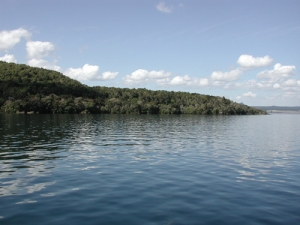Farmers send clear message
A cacophany of sounds - barking dogs, the roar of tractors and tooting ute horns - descended on towns and cities around the country on Friday, July 16.
 The formal warnings, from the Waikato Regional Council, will be taken into account should there be any other breaches in future.
The formal warnings, from the Waikato Regional Council, will be taken into account should there be any other breaches in future.
A Waikato company and a landowner have both received a formal warning after a breach of rules designed to protect Lake Taupo from nitrogen leaching.
The formal warnings, from the Waikato Regional Council, will be taken into account should there be any other breaches in future.
The complicated case involved the company grazing stock, for at least a month, on land that was only supposed to be used for forestry. That means the amount of nitrogen leaching from the land to the lake over time, due to the cattle being grazed there, could exceed the permitted amount.
"There has been a very significant public investment in the protection of Lake Taupo and it is important we hold people to account when they breach the rules," says the council's farming services manager Nicole Botherway.
"A warning is judged appropriate in this case, given the admission of fault and the amount of excess nitrogen likely to have been involved. But any further breaches by the parties could warrant a more significant response."
The case follows a similar one last year where a farmer who failed to meet his farming consent conditions near Taupo was also formally warned over the breach.
"Local people, the council and the trust are determined to protect the integrity of the rules protecting Lake Taupo. We will continue to respond to reports of breaches of consent conditions and take action where appropriate," says Botherway.
"We need the public to be our eyes and ears and, if they see cattle grazing in forestry areas, they should alert the council's Taupo office on 0800 800 401."
New DairyNZ research will help farmers mitigate the impacts of heat stress on herds in high-risk regions of the country.
Budou are being picked now in Bridge Pā, the most intense and exciting time of the year for the Greencollar team – and the harvest of the finest eating grapes is weeks earlier than expected.
The Real Estate Institute of New Zealand (REINZ) has released its latest rural property report, providing a detailed view of New Zealand’s rural real estate market for the 12 months ending December 2025.
Rural retailer Farmlands has released it's latest round of half-year results, labeling it as evidence that its five-year strategy is delivering on financial performance and better value for members.
OPINION: "We are back to where we were a year ago," according to a leading banking analyst in the UK, referring to US president Donald Trump's latest imposition of a global 10% tariff on all exports into the US.
DairyNZ says the Government’s proposed Resource Management Act reform needs further work to ensure it delivers on its intent.